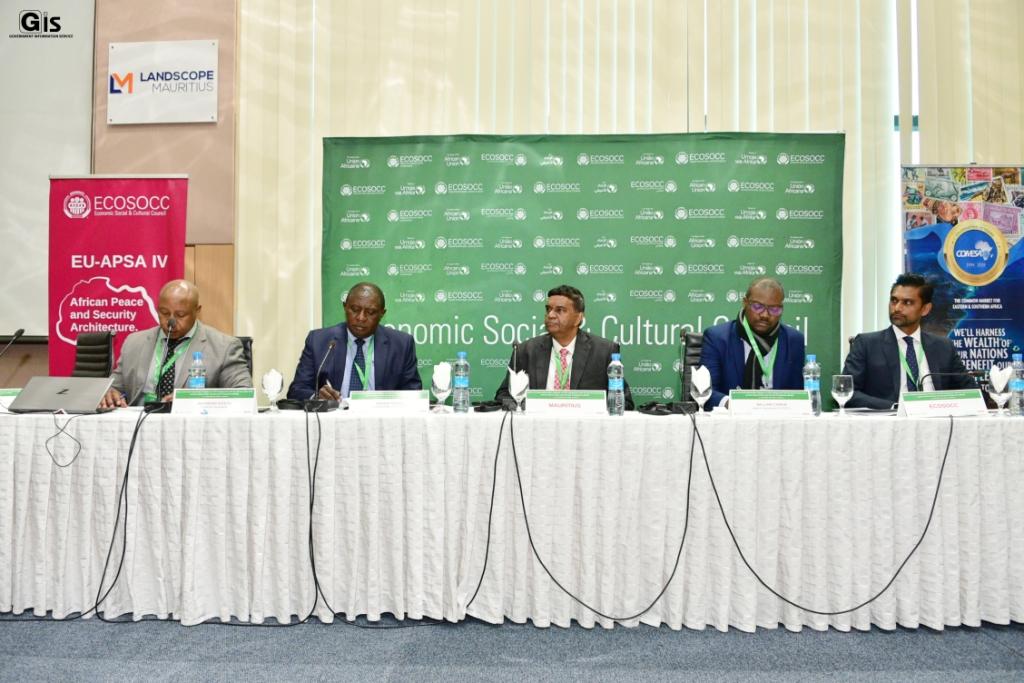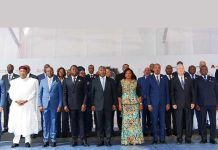
Africa-Press – Mauritius. The Economic, Social and Cultural Council’s (ECOSOCC) High-Level Multi-Stakeholder Dialogue on Civil Society Organisation (CSO) engagement with the African Union (AU) and the African Peace and Security Architecture (APSA), aiming to promote conflict prevention, crisis management, and post-conflict reconstruction and development, opened, this morning, at Shri Atal Bihari Vajpayee Tower, in Ebène Cybercity.
The Ambassador of the Republic of Mauritius to the AU and the Federal Democratic Republic of Ethiopia, Mr Dharmraj Busgeet; the Head of Secretariat, ECOSOCC, Mr William Carew; the Conflict Early Warning Expert (Governance, Peace and Security) COMESA, Mr Raymond Kitevu; the Presiding Officer, ECOSOCC, Mr Denise Kodhe; and other personalities were present. The three-day meeting is facilitating the high-level multi-level dialogue with AU Member States’ CSOs, Regional Mechanisms (RMs), and experts.
It is expected that the discussions during the meeting will increase CSOs’ knowledge of the mechanisms put in place to fortify their engagement with the AU, as well as their participation in AU programmes related to conflict prevention, management and resolution, democracy, governance, constitutionalism, the rule of law, human rights, and transitional justice.
The meeting is seeking to bridge the gap between the AU, Regional Economic Communities (RECs), RMs and CSOs; and build on the expertise and capacities of CSOs in conflict prevention, crisis management, and post-conflict reconstruction and development.
In his speech, Ambassador Busgeet, lauded the High-Level Multi-Stakeholder Dialogue initiative and expressed gratitude to the organisers for having chosen Mauritius to host this event. He recalled that Mauritius is very much part of the African continent and reiterated Mauritius’s commitment in promoting regional cooperation.
The Ambassador further invited participants to share their vision and perspective during the High-Level Dialogue’s various sessions which are focusing on the EU-AU Partnership, the EU-APSA programme, existing instruments such as the Maseru Conclusion, and the role of ECOSOCC in facilitating interactive engagement.
Mr Carew, for his part, emphasised that the journey to actualising the effective coordination, partnership and meaningful participation of African Civil Societies in AU’s support projects has undergone a series of rigorous and technical phases.
We can relish that today’s meeting signifies a watershed in the journey so far, he shared. African civil societies, he highlighted, have continued to distinguish themselves as key actors and partners in mitigating violence and facilitating the conditions necessary for building sustainable peace on the continent.
ECOSOCC, Mr Carew further stated, as the AU organ mandated to facilitate civil society participation in the AU is ever committed to the full implementation of the various programmes targeting CSOs and taking forward the partnerships with the RECs and the RMs, amongst others.
As for Mr Kitevu, he acknowledged the role played by CSOs in promoting security and peace in the region and for their contribution within the COMESA. According to him, it is important to enhance the role of CSOs in the existing frameworks including the APSA and other development initiatives.
In his address, Mr Kodhe, stressed on the importance of transformative leaderships and the need of holding high-level dialogues on activities that require the engagement of all stakeholders and consequently to shape, advise and provide policy guidelines to Governments in a bid to move forward development agendas.
For More News And Analysis About Mauritius Follow Africa-Press






